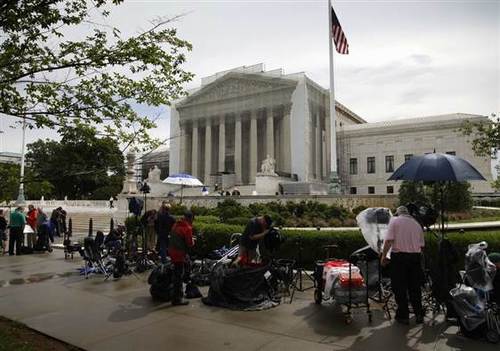Community organizing is even more critical after the United States Supreme Court’s decision to strike down a key provision from the Voting Rights Act of 1965 earlier today. Voting rights suffered an unnecessary setback with the Supreme Court’s decision in Shelby v. Holder (June 25, 2013). Section 5 is a part of the Voting Rights Act of 1965 which requires certain jurisdictions, identified in Section 4 of the Act, to get preclearance before implementing any changes affecting voting.
In an opinion not consistent with decades of Supreme Court precedent, this Court struck down Section 4 deemed the coverage formula which determined which states and counties had to obtain preclearance before changing its voting laws. Without the coverage formula, states with histories of discriminatory voting practices do not have to consult with the Department of Justice before changing its voting laws. The Court has effectively removed any barriers preventing re-implementation of legislation that prejudices the voting rights of vulnerable populations.
How Can I Help
One of the most important elements of Section 5 is the notification requirements and comment processes the Voting Rights Act established and the centralized flow of information through the U.S. Department of Justice (DOJ). Since the implementation of the Voting Rights Act of 1965, jurisdictions had to seek input from affected minority voters and submit information about the proposed change to DOJ. They are no longer required to do so. Now, organizations on the ground will need to develop a procedure for collecting and disseminating this vital information.
- Voting rights advocates and communities still have options for challenging discriminatory voting laws, but they’ll have to be more proactive in bringing those challenges. We can no longer rely on the Section 5 process. Grassroots community organizers should begin by identifying voting rights experts and attorneys that have the capacity to help challenge bad voter laws. The Southern Coalition for Social Justice is one of those resources in many areas, and we can refer you to resources in geographic areas we don’t have the capacity to help. E-mail us at info@southerncoalition.org.
- This is critical: we need community organizations on the ground to track changes and potential changes in voting laws. There are jurisdictions that will try to pass bad changes under the radar. Develop a plan to have your representatives at county commission, school board, and city council meetings, so that you can be aware of proposed changes. Develop relationships with county boards of elections so that you will have another avenue for notification of changes to election laws. Identify any changes to voting laws that may have already been enacted, but were not yet implemented because of Section 5. Also, identify when those changes may become effective and establish a reporting system for immediate dissemination.
- Working with the voting rights experts and attorneys you’ve identified at either SCSJ or other groups. Develop a mechanism for communicating potential changes in voting laws. Attorneys will need to file lawsuits and seek preliminary injunctions and seek rulings from courts halting the implementation of bad voting laws. But we can’t file those lawsuits unless we know about the changes. Decide on a plan for conveying information about changes in the law.
The best way to fight back against changes that will be detrimental to voters of color is to elect officials who will be respectful of voting rights which means voter registration and Get Out The Vote work is even more critical. Let potential voters know their voting rights are at stake. Let’s get them registered and make sure they cast their vote on Election Day!
For Information on North Carolina Voter ID Laws, view below:














